SUMMARY
This is AI generated summarization, which may have errors. For context, always refer to the full article.
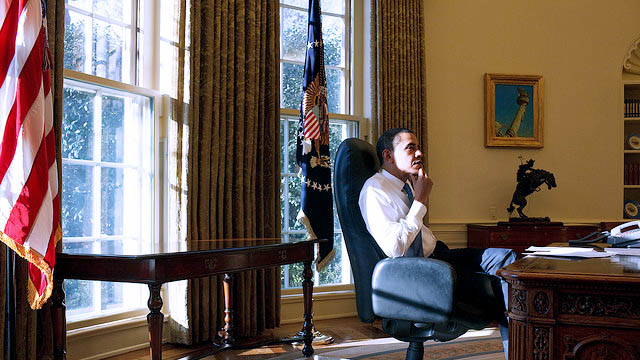
CHICAGO, Illinois, United States – US President Barack Obama headed back to Washington on Wednesday, November 7, emboldened by his re-election but facing the daunting task of breaking down partisan gridlock in a bitterly divided Congress.
Before leaving Chicago in the afterglow of his euphoric win, Obama was on the phone trying to bridge the divide with Republican leaders as America stares at a looming financial crisis that could plunge it back into recession.
The president and his family departed Chicago aboard Air Force One for the White House after a stunning election win that saw him hold nearly all the states he won in a 2008 landslide, despite the flagging US economy.
In his victory speech, Obama promised “the best is yet to come” after handily defeating challenger Mitt Romney, but his in-tray is overflowing with first term plans thwarted by blanket Republican opposition.
Whether on immigration reform, health care or a grand plan to rein in the ballooning budget deficit, the president struggled for four years to find compromise in Congress and some questioned if he had the political chops.
The big question at the start of Obama’s second term is this: Will the Republicans blink on the looming “fiscal cliff” and strike a deal that will avert a catastrophic economic crunch forced by mandatory budget cuts?
“In the weeks ahead, I also look forward to sitting down with Governor Romney to talk about where we can work together to move this country forward,” the president told the country in his rousing acceptance speech.
But Obama knows it is not his vanquished foe that he must now deal with but rather the Republican leadership in Congress, which may dig its heels in after failing in its stated goal: to make him a one-term president.
Obama won despite the highest unemployment rate of any president since Franklin Roosevelt in 1936 and became only the second Democrat since then to win a second term.
With Florida still counting, Obama had 303 electoral votes — well over the 270 needed to win the White House.
Despite his resounding Electoral College victory, leading Republicans were already challenging his mandate, pointing to his slim lead in the national popular vote where he led Romney by 50 percent to 49 percent.
“I think the real story here is that Obama won, but he’s got no mandate,” leading conservative commentator Charles Krauthammer declared on Fox News.
“The Republicans are in control of the House… They are not going to budge. There’s no way after holding out on Obama for two years they’re going to cave in, and Obama doesn’t have anywhere really to go.”
Obama’s first move the day after re-election was to call congressional leaders, sending out an overt message that his immediate priority was to try to break the domestic political deadlock.
The president spoke to Republican House Speaker John Boehner and also telephoned the minority Republican leader in the Senate, Mitch McConnell, as well as top Democrats.
“The president reiterated his commitment to finding bipartisan solutions to: reduce our deficit in a balanced way, cut taxes for middle class families and small businesses and create jobs,” a White House official said.
Obama believed Americans sent a message to Washington by returning him for a second term that both parties should put aside partisan interests to put the economy first, the official said.
But Boehner offered little in the way of movement during a Wednesday press conference in which his opening gambit was an unpalatable short-term fix to the “fiscal cliff” that the president has repeatedly opposed.
Obama looks to his legacy
As Obama’s victory was confirmed with wins in rust-belt Ohio and his spiritual political home in Iowa, large crowds materialized outside the White House, chanting “four more years” and “O-bama, O-bama.”
Republican nominee Romney, 65, deflated and exhausted, offered a classy tribute, as he consoled dejected supporters in Boston moments after phoning Obama to formally concede.
“This is a time of great challenges for America and I pray that the president will be successful in guiding our nation,” Romney said.
Obama’s victory means he will get the chance to embed his healthcare and Wall Street reforms deep into the fabric of American life. Romney had pledged one of his first acts would be to repeal Obamacare.
The president may also get the chance to reshape the Supreme Court in his liberal image for a generation, a move that would shape policy on issues like abortion and gay rights.
Obama will also look abroad as he builds his legacy, and will face an immediate challenge early in 2013 over whether to use military force to thwart Iran’s nuclear program.
The president ran for re-election on a platform of offering a “fair shot” to the middle class, of fulfilling his pledge to end the war in Iraq, killing Osama bin Laden, and starting to build a clean energy economy.
Obama won with a fiercely negative campaign branding Romney — a multi-millionaire former corporate turnaround wizard — as indifferent to the woes of the middle class.
Remarkably, Obama’s coalition of Hispanic, black, and young voters turned out in similar numbers to those of his heady change-fueled campaign in 2008, shocking Romney’s team and presenting a new American face to the world.
World leaders hailed Obama’s re-election, with allies pledging to deepen cooperation with the United States on fighting the world economic slump and maintaining security across the globe.
A Myanmar government official announced that Obama would visit the former pariah state on November 19 in what could be his first foreign trip since re-election.
The president’s focus is expected to dwell on avoiding the “fiscal cliff” — a combination of dramatic spending cuts and tax increases that will take effect January 1 if lawmakers don’t cut a deal on the deficit.
Democrats kept the Senate in Tuesday’s vote but fell short of the 60-vote super-majority needed to sidestep Republican blocking tactics. – Tangi Quemener, Agence France-Presse
Add a comment
How does this make you feel?
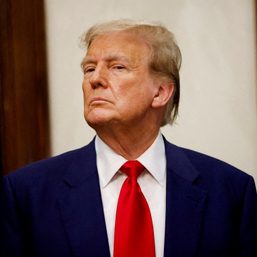
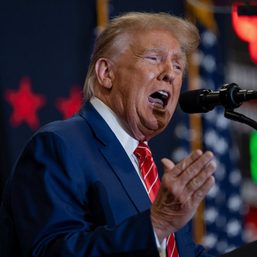
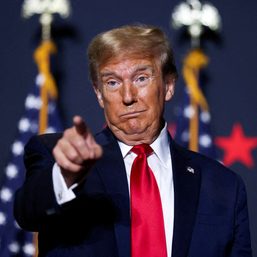
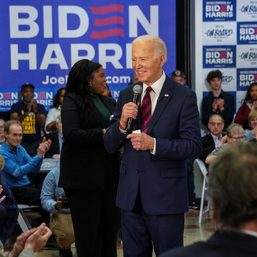
There are no comments yet. Add your comment to start the conversation.